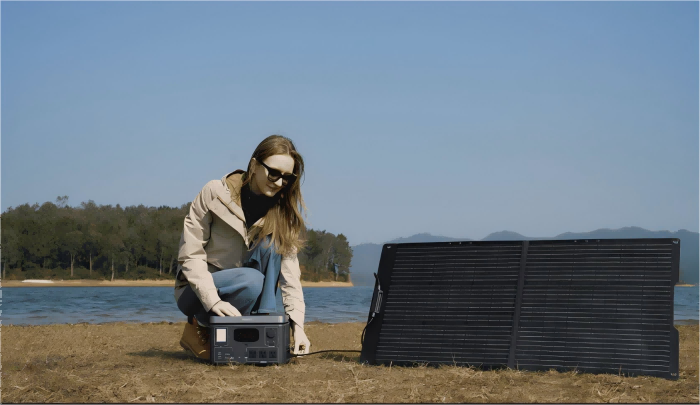Portable solar generators offer a versatile and eco-friendly solution for power needs, but their capability to power a house depends on several factors. This guide explores the potential of portable solar generators to meet household energy requirements, considering their limitations, advantages, and the factors influencing their performance.
1. Understanding Portable Solar Generators
1.1 What is a Portable Solar Generator?
A portable solar generator is a compact, battery-powered device that converts solar energy into electricity. It typically includes a solar panel, a battery pack, and an inverter to provide a renewable power source for various applications. These generators are designed for mobility and convenience, making them suitable for outdoor use, emergencies, and off-grid scenarios.
1.2 Key Components
The key components of a portable solar generator include solar panels, which capture sunlight and convert it into electrical energy; a battery pack, which stores the generated electricity for later use; and an inverter, which converts stored DC power into AC power for household appliances.
2. Assessing Power Needs
2.1 Calculate Household Energy Consumption
To determine if a portable solar generator can power your house, calculate your household’s total energy consumption. Consider the wattage of essential appliances and devices, including lighting, refrigeration, heating, and electronics. Typical household power consumption ranges from 5,000 to 10,000 watts, depending on the size and efficiency of the home.
2.2 Estimate Peak and Continuous Power Requirements
Evaluate both peak and continuous power requirements. Peak power refers to the maximum wattage needed at any given moment, often higher due to the startup surge of appliances. Continuous power is the amount of power required to run devices consistently over time. Ensure that the portable solar generator can handle both peak and continuous power demands.
3. Capabilities of Portable Solar Generators
3.1 Power Output and Capacity
Portable solar generators come in various sizes and capacities, typically ranging from 500 to 3,000 watts. Generators on the lower end of the spectrum may only support small appliances or provide backup power during outages, while larger models can handle more significant loads. Check the generator’s specifications to ensure it meets your power needs.
3.2 Battery Capacity and Runtime
The battery capacity of a portable solar generator affects how long it can supply power. Larger battery packs provide longer runtimes but may require more solar panels for charging. Assess the generator’s battery capacity and runtime to determine if it aligns with your household’s energy requirements.
3.3 Solar Panel Efficiency
The efficiency of the solar panels impacts how quickly the generator recharges. Higher-efficiency panels convert more sunlight into electricity, reducing recharge time. Consider the panel’s wattage and efficiency when evaluating the generator’s ability to replenish its battery.
4. Factors Influencing Performance
4.1 Solar Panel Placement and Sunlight Exposure
The effectiveness of a portable solar generator depends on optimal sunlight exposure. Ensure that the solar panels are placed in a location with maximum sun exposure, free from obstructions like trees or buildings. Shade and weather conditions can affect the performance and charging efficiency.
4.2 Energy Storage and Management
Efficient energy storage and management are crucial for maximizing the generator’s performance. Monitor battery levels and manage energy usage to prevent overloading or depleting the battery too quickly. Some generators come with energy management systems to optimize power distribution and extend battery life.
4.3 Weather Conditions
Weather conditions play a significant role in solar energy generation. Overcast skies, rain, or snow can reduce the amount of sunlight reaching the solar panels, impacting the generator’s ability to produce and store power. Consider the local climate and weather patterns when relying on a portable solar generator for household power.
see also: TOP 5 Rated Portable Solar Generators: Best Options for Versatile Power Solutions
5. Advantages and Limitations
5.1 Advantages
Portable solar generators are eco-friendly, using renewable energy and reducing reliance on fossil fuels. They offer portability, allowing flexibility for various locations and uses, including outdoor activities and emergencies. Additionally, they operate quietly, making them suitable for residential use.
5.2 Limitations
However, portable solar generators have limitations. They typically have a lower power output compared to traditional generators, which may make them less suitable for large homes or high-wattage appliances. Their performance is directly dependent on sunlight availability, which can be inconsistent due to weather or geographical location. Furthermore, they can be expensive upfront, especially for higher-capacity models.
6. Making the Right Choice
6.1 Assess Your Power Needs
Determine the specific power needs of your household and match them with the capabilities of the portable solar generator. Consider both your immediate and future energy requirements to ensure the generator provides adequate power.
6.2 Choose a Suitable Model
Select a portable solar generator that aligns with your power needs, budget, and usage preferences. Compare different models based on power output, battery capacity, solar panel efficiency, and additional features.
6.3 Plan for Backup Power
For households with high energy demands or in regions with limited sunlight, consider using the portable solar generator as a supplementary power source rather than the primary one. Combine it with other power solutions, such as traditional generators or grid power, to ensure a reliable energy supply.
Conclusion
While a portable solar generator can provide valuable power for certain household applications, it may not be sufficient for powering an entire house, especially during high-demand periods or in areas with limited sunlight. By understanding the capabilities and limitations of portable solar generators, you can make an informed decision about their suitability for your power needs. Careful planning, proper usage, and considering backup options will help ensure that you have a reliable and efficient energy solution for your home.
Related topics:
- TOP 4 Major Solar Generator Manufacturers
- Why Blueti is the leading manufacturer of solar generators?
- Top 10 Solar Generators for 2024

